A new planet with three times the mass of Jupiter has been discovered in the galaxy.
Dubbed TOI-2180 b, the planet was found by Citizen Scientist Tom Jacobs using data collected by Nasa’s Transiting Exoplanet Survey Satellite (TESS).
The gas giant orbits its stars in just 261 days- compared to Jupiter which takes around 12 Earth years to travel around our Sun.
The discovery was reported in the Astronomical Journal.
Tom found TO1 having taken part in the Planet Hunter initiative which looks at the collected data. He spotted something irregular in February 2020 and flagged it to two scientists, who later confirmed the find.
He said: “Discovering and publishing TOI-2180 b was a great group effort demonstrating that professional astronomers and seasoned citizen scientists can successfully work together.

“It is synergy at its best.”
Scientists say the planet is around 379 lightyears away from Earth and has around 105 earth masses of elements heavier than hydrogen and helium.
Around 4,800 exoplanets have been confirmed with billions more suspected to be in our galaxy.
Paul Dalba, from the University of California, Riverside, added: “The manual effort that they put in is really important and really impressive because it’s actually hard to write code that can go through a million light curves and identify single transit events reliably,” “This is one area where humans are still beating code.”
It comes as an asteroid bigger than any building on Earth is set to soar past the planet tomorrow.
It has been named 7482 (1994 PC1) and is more than a kilometre wide at 1,052 metres (3,451 feet) - making it bigger than the world's tallest building the Burj Khalifa in Dubai which is 830 metres (2,723feet).
However, it poses no threat to Earth and when it passes it will still be more than five times the moon's distance from the planet.






